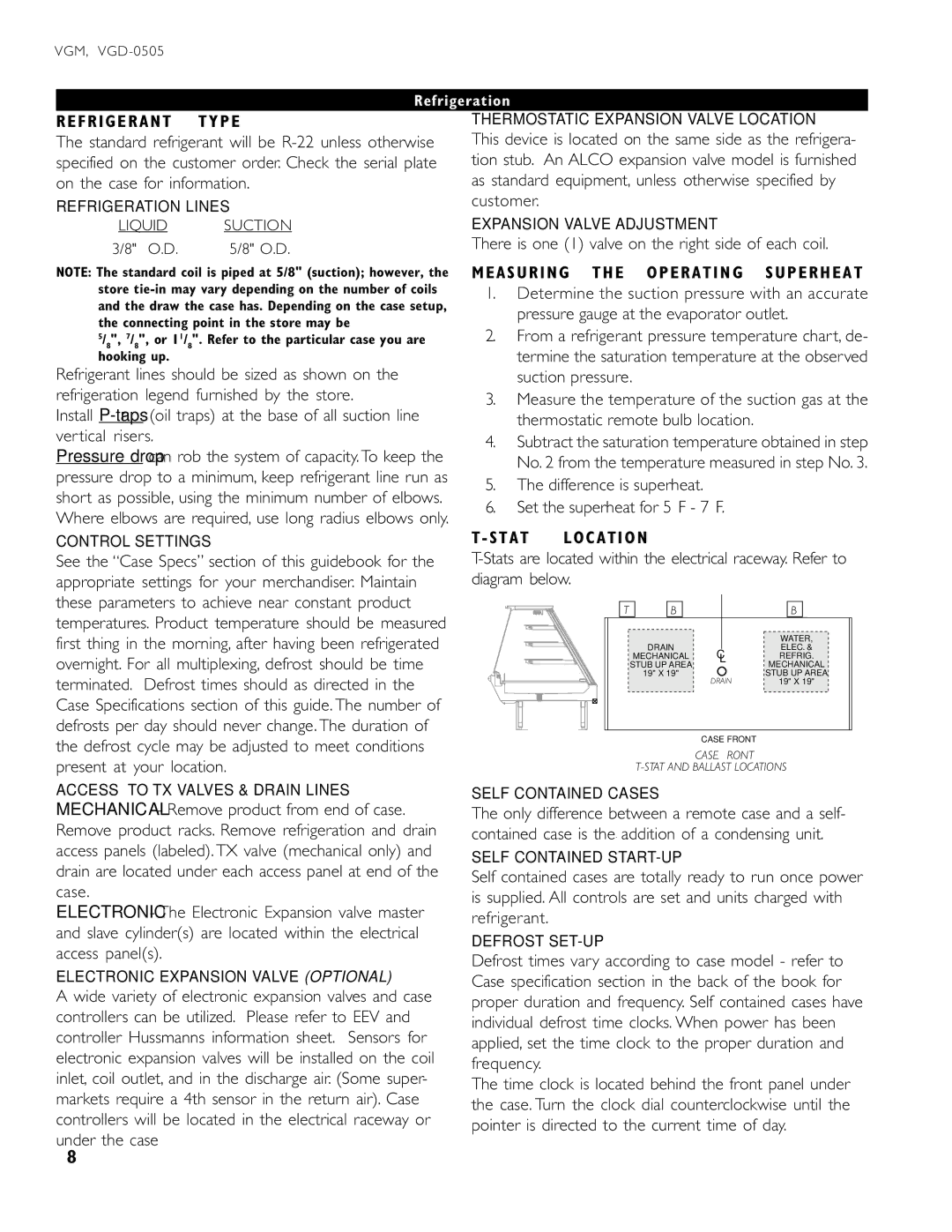
VGM,
Refrigeration
REFRIGERANT TYPE
The standard refrigerant will be
REFRIGERATION LINES
LIQUID SUCTION
3/8" O.D. | 5/8" O.D. |
THERMOSTATIC EXPANSION VALVE LOCATION
This device is located on the same side as the refrigera- tion stub. An ALCO expansion valve model is furnished as standard equipment, unless otherwise specified by customer.
EXPANSION VALVE ADJUSTMENT
There is one (1) valve on the right side of each coil.
NOTE: The standard coil is piped at 5/8" (suction); however, the store
5/8", 7/8", or 11/8". Refer to the particular case you are hooking up.
Refrigerant lines should be sized as shown on the refrigeration legend furnished by the store.
Install
Pressure drop can rob the system of capacity. To keep the pressure drop to a minimum, keep refrigerant line run as short as possible, using the minimum number of elbows. Where elbows are required, use long radius elbows only.
MEASURING THE OPERATING SUPERHEAT
1.Determine the suction pressure with an accurate pressure gauge at the evaporator outlet.
2.From a refrigerant pressure temperature chart, de- termine the saturation temperature at the observed suction pressure.
3.Measure the temperature of the suction gas at the thermostatic remote bulb location.
4.Subtract the saturation temperature obtained in step No. 2 from the temperature measured in step No. 3.
5.The difference is superheat.
6.Set the superheat for 5°F - 7°F.
CONTROL SETTINGS
See the ÒCase SpecsÓ section of this guidebook for the appropriate settings for your merchandiser. Maintain these parameters to achieve near constant product temperatures. Product temperature should be measured first thing in the morning, after having been refrigerated overnight. For all multiplexing, defrost should be time terminated. Defrost times should as directed in the Case Specifications section of this guide. The number of defrosts per day should never change. The duration of the defrost cycle may be adjusted to meet conditions present at your location.
ACCESS TO TX VALVES & DRAIN LINES
MECHANICAL - Remove product from end of case. Remove product racks. Remove refrigeration and drain access panels (labeled). TX valve (mechanical only) and drain are located under each access panel at end of the case.
ELECTRONIC - The Electronic Expansion valve master and slave cylinder(s) are located within the electrical access panel(s).
ELECTRONIC EXPANSION VALVE (OPTIONAL)
A wide variety of electronic expansion valves and case controllers can be utilized. Please refer to EEV and controller Hussmanns information sheet. Sensors for electronic expansion valves will be installed on the coil inlet, coil outlet, and in the discharge air. (Some super- markets require a 4th sensor in the return air). Case controllers will be located in the electrical raceway or under the case
T - STAT LOCATION
|
|
|
|
|
|
|
|
|
|
|
| T |
| B |
|
|
|
| B |
| |
|
|
|
|
|
|
|
|
|
|
|
|
|
|
|
|
|
| WATER, |
| ||
|
| DRAIN |
|
| ELEC. & |
| ||||
|
| C |
| |||||||
|
| MECHANICAL | REFRIG. |
| ||||||
|
| STUB UP AREA | L | MECHANICAL |
| |||||
|
| 19" X 19" | DRAIN | STUB UP AREA |
| |||||
|
|
|
|
| 19" X 19" |
| ||||
|
|
|
|
|
|
|
|
|
|
|
|
|
|
|
|
|
|
|
|
|
|
CASE FRONT
CASE FRONT
SELF CONTAINED CASES
The only difference between a remote case and a self- contained case is the addition of a condensing unit.
SELF CONTAINED
Self contained cases are totally ready to run once power is supplied. All controls are set and units charged with refrigerant.
DEFROST
Defrost times vary according to case model - refer to Case specification section in the back of the book for proper duration and frequency. Self contained cases have individual defrost time clocks. When power has been applied, set the time clock to the proper duration and frequency.
The time clock is located behind the front panel under the case. Turn the clock dial counterclockwise until the pointer is directed to the current time of day.
8
